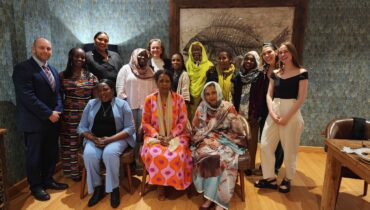Originally posted here.
In a faculty research seminar on April 23, Margaret Jenkins presented her ongoing research on all-female peacekeeping units. She is currently a research associate at the Georgetown Institute for Women, Peace & Security and a research fellow in the Women and Public Policy Program at the Harvard Kennedy School of Government. This piece will explore the aspects of her research shared in the faculty seminar.
Margaret Jenkins argues that despite the passage of Security Council Resolution 1325 in 2000, which mandates women’s equal participation, the protection of women’s rights, and the prevention of gender-based violence in peacekeeping and post-conflict reconstruction, progress has been slow during the last 15 years. By studying female peacekeeping contingents, she hopes to further illuminate the challenges to gender mainstreaming in peacekeeping and security operations, and offer innovative insight into how these challenges could be overcome.
Jenkins focused her attention on one case in particular: an all-female, unarmed, civilian peacekeeping unit in Mindanao, an island in the southern Philippines. Mindanao, sometimes called the “wild west” of Southeast Asia, has been a long-time conflict zone between Islamic insurgent movements, such as the Moro Islamic Liberation Front (MILF), and the Government of the Philippines (GoP). While the peace process between the MILF and the GoP began in 2001 and culminated in a political agreement signed in 2014, the region remains very dangerous. It is in this environment, Jenkins explained, that the Mindanao Peoples Caucus (MPC), led by Mary Ann Arnado, a charismatic human rights lawyer from the region, founded an all-female peacekeeping contingent comprised of Muslim, Catholic, and indigenous women all from Mindanao.
In her presentation, Jenkins described the significant skepticism and resistance the group has faced on the ground, especially at the beginning of its operations, and how they have strategically responded. One crucial factor in the group’s success has been their strong working relationship with key actors in the region, including the MILF and the Armed Forces of the Philippines. Jenkins argued that while it seems surprising that the all-female contingent has a positive working relationship with an all-male Islamist militant group that subscribes to traditional gender norms, this relationship has been developed over a decade of working together. The MILF values the MPC’s expertise and local network, and has relied upon them for assistance with inter-faith consultations, and other aspects of the peace process.
Nevertheless, Jenkins’s interviews with the peacekeepers revealed that some of the women felt they weren’t taken seriously, particularly by soldiers from the International Monitoring Team, who are on one-year deployments from abroad. In addition, some of the women peacekeepers themselves were concerned that speaking with soldiers and militants might be against Islamic doctrine, and one of the group’s close partners, a Muslim peacekeeping organization, argued that it was employing women in a capacity that was forbidden by religious law. The group faced other criticisms including not conforming to local gender realities, not being “tough enough,” and being incompetent and lacking necessary military and security experience.
Despite these criticisms and challenges, the all-female peacekeeping contingent continues to play an important role in Mindanao. The group also demonstrates to both men and women in the region that Christian, Muslim, and indigenous can come together for peace, and that women in particular can effectively serve on the front lines of peacekeeping.


